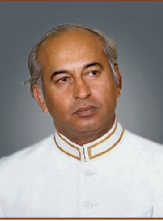
Zulkar Ali Bhutto
The period from 1971 to 1977 marked a significant and tumultuous chapter in the history of Pakistan, as it was dominated by the charismatic leadership of Zulfikar Ali Bhutto. Bhutto’s tenure as the Prime Minister of Pakistan brought about both remarkable achievements and profound challenges. This article explores the key events and policies of the Bhutto era, shedding light on the complex legacy of this charismatic leader.
The Ascendancy of Zulfikar Ali Bhutto
Zulfikar Ali Bhutto, a dynamic and flamboyant politician, rose to prominence during the 1960s as Pakistan’s Foreign Minister under President Ayub Khan. However, his growing disillusionment with Ayub Khan’s autocratic rule led to his resignation in 1966. Bhutto’s subsequent formation of the Pakistan People’s Party (PPP) in 1967 signaled the start of a new era in Pakistani politics.
The 1970 Elections and the Birth of Bangladesh
One of the most defining moments of this period was the 1970 general elections, which saw the PPP sweeping the west wing of Pakistan and the Awami League, led by Sheikh Mujibur Rahman, winning a landslide victory in the east wing, now Bangladesh. This stark regional divide led to a constitutional crisis and eventually, the violent Bangladesh Liberation War, resulting in the secession of East Pakistan and the birth of Bangladesh in December 1971.
Bhutto assumed the role of President and later Prime Minister in the aftermath of Pakistan’s dismemberment. He faced immense challenges in rebuilding the nation’s shattered morale and economy. His charisma and fiery oratory provided a rallying point for a wounded nation.
Land Reforms and Nationalization
During Bhutto’s tenure as Prime Minister, he implemented a series of sweeping reforms aimed at addressing social and economic inequalities. His government initiated land reforms, imposing ceilings on landholdings to break the monopoly of feudal landlords. This move was applauded for its potential to empower the landless peasants, but it also faced stiff resistance from the vested interests of the landlords.
Bhutto’s policy of nationalization was another landmark decision. Major industries, including banking, steel, and key sectors of manufacturing, were taken under state control. While this aimed to reduce the influence of the industrial elite, critics argue that it resulted in inefficiency and economic stagnation.
Foreign Policy and Nuclear Program
Bhutto’s foreign policy was marked by assertiveness and a desire for greater self-reliance. He pursued closer ties with Muslim nations and played a pivotal role in the formation of the Organization of Islamic Cooperation (OIC). Furthermore, Bhutto’s government initiated Pakistan’s nuclear weapons program, which would have profound implications for the region’s strategic balance in the decades to come.
Challenges and Opposition
Despite his ambitious reforms and foreign policy initiatives, Bhutto’s era was marred by growing discontent and political opposition. His authoritarian tendencies, allegations of election rigging, and suppression of dissent led to mounting criticism from opposition parties, civil society, and the press. Protests and strikes became increasingly common, resulting in a turbulent political environment.
The End of the Bhutto Era
The Bhutto era came to a dramatic and tragic end in July 1977 when General Muhammad Zia-ul-Haq staged a military coup, citing corruption and mismanagement as reasons for his intervention. Bhutto was arrested and later sentenced to death in a controversial trial. Despite international appeals for clemency, Bhutto was executed in April 1979, leaving a profound impact on Pakistan’s political landscape.
Conclusion
Zulfikar Ali Bhutto’s era from 1971 to 1977 was a period of significant transformation in Pakistan’s history. While he made strides in addressing social and economic disparities, his rule was characterized by political turbulence, authoritarian tendencies, and a controversial foreign policy. The complex legacy of Bhutto continues to shape Pakistan’s political discourse and remains a subject of debate among historians and analysts. His charismatic leadership, ambitious reforms, and tragic downfall continue to be a source of fascination and controversy in the annals of Pakistan’s history.
